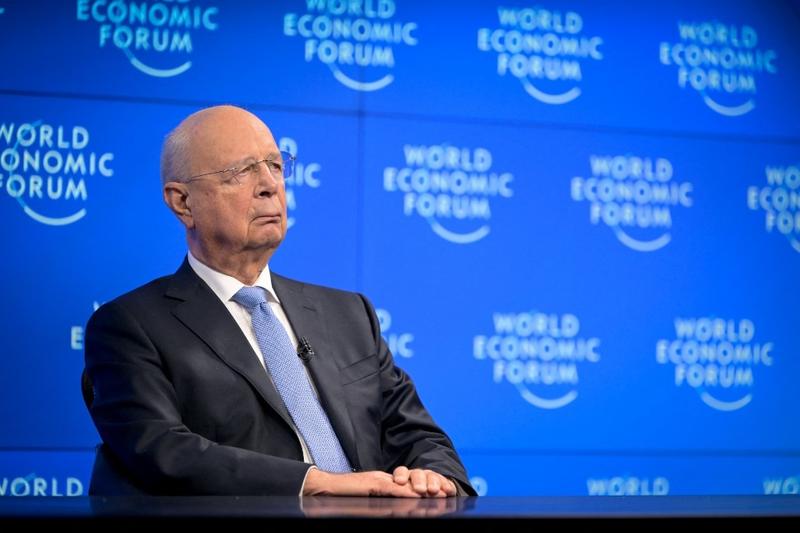 Founder and Executive Chairman of the World Economic Forum (WEF) Klaus Schwab is seen at the opening of the WEF Davos Agenda virtual sessions at the WEF's headquarters in Cologny near Geneva on Jan 17, 2022. (FABRICE COFFRINI / AFP)
Founder and Executive Chairman of the World Economic Forum (WEF) Klaus Schwab is seen at the opening of the WEF Davos Agenda virtual sessions at the WEF's headquarters in Cologny near Geneva on Jan 17, 2022. (FABRICE COFFRINI / AFP)
GENEVA - The World Economic Forum (WEF) on Tuesday warned that the accelerating pace of digitalization fueled by the COVID-19 pandemic has led to a record-breaking year for ransomware attacks, with global attack volume increasing by 151 percent in the first half of 2021.
The WEF's new annual report "The Global Cybersecurity Outlook 2022" showed that there were on average 270 cyberattacks per organization in 2021, a 31 percent increase over 2020.
The report by the Geneva-based forum also showed that 80 percent of cyber leaders now consider ransomware is a dangerous and evolving threat to public safety
The cost of breaches to an organization is high, amounting to an average of $3.6 million per incident, said the report.
"The outlook is quite grim," Algirde Pipikaite, cybersecurity strategy lead at the WEF, told Xinhua via video link.
"We see multiple spheres of life being affected by criminal cyber activities, oil and gas supply being diminished, manufacturing being stopped, production of food supply completely dismantled. There's a lot that should be done, and that we as a community should be coming together," she said.
Pipikaite said that two main types of attacks are of concern to cyber leaders: "One is ransomware. It's going to continue increasing until we are really going to get our cybersecurity fundamentals in order. The second one is the attacks on critical infrastructure systems and how that could hinder our ability to receive basic public services."
ALSO READ: Facebook data on 533m users reemerges online for free
The report by the Geneva-based forum also showed that 80 percent of cyber leaders now consider ransomware is a dangerous and evolving threat to public safety and there is a large perception gap between CEOs who think their companies are secure and security leaders who disagree.
"We have a strong opinion at the World Economic Forum that neither governments nor the private sector will be able to resolve the ongoing global cybersecurity challenges by themselves. That requires very strong collaboration between the public and private sectors to improve the response to cyber-criminal activities," Pipikaite added.
"Currently, cybercriminals are winning because our response is localized while cyber-criminal activities do not know any borders, and they go cross borders, cross regions, cross continents. Focusing on law enforcement response and better collaboration between the governments and between the private sector players would improve our ability to respond and actually keep the cybercriminals accountable," said Pipikaite.
The report stressed that cybersecurity is no longer a sufficient tactic, but that building resilience needs to be integrated into an organization's strategy.
"Organizations need to work more closely with ecosystem partners and other third parties to make cybersecurity part of an organization's ecosystem DNA, so they can be resilient and promote customer trust," said Julie Sweet, chair and CEO of IT services and consulting company Accenture, in a press release published on the WEF's website.
"This report underscores key challenges leaders face, collaborating with ecosystem partners and retaining and recruiting talent," said Sweet.
ALSO READ: Internet crime crackdown leads to 60,000 arrests
In terms of solutions, Pipikaite highlighted that employee cyber training, offline backups, cyber insurance and platform-based cybersecurity solutions that stop known ransomware threats across all attack vectors are key.
She also stressed that by using artificial intelligence and automation systems, defenders are able to shorten the attack time and respond to incidents faster:
"But don't be fooled. Cybercriminals are also applying these new technologies and are attacking in a much more organized, better, faster and more efficient way, and increasing the frequency and efficiency of their attacks. They are becoming much more sophisticated," she said.
Last month, the WEF announced that it will defer its annual meeting usually held in January in the Swiss ski resort of Davos in light of the continued uncertainty over the Omicron variant outbreak.
READ MORE: Tougher punishment coming for promoters of fake websites
Instead, the forum is hosting the online Davos Agenda 2022 from Jan 17 to Jan 21 and a series of virtual plenaries with the objective of orienting global leaders on the imperatives of the year ahead.


